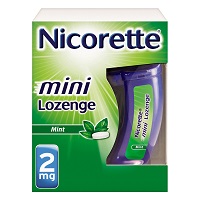 Manufacturing problems at a plant in Aiken, SC, last year led GlaxoSmithKline ($GSK) to recall 335,000 vials of Nicorette Lozenges. After more than a year of upgrades, GSK says it believes Nicorette Mini Lozenges will be on retailers' shelves by early April and full size later this year. It is none too soon for dedicated users of the over-the-counter product, who have been scrounging for them since supplies began to dry up.
Manufacturing problems at a plant in Aiken, SC, last year led GlaxoSmithKline ($GSK) to recall 335,000 vials of Nicorette Lozenges. After more than a year of upgrades, GSK says it believes Nicorette Mini Lozenges will be on retailers' shelves by early April and full size later this year. It is none too soon for dedicated users of the over-the-counter product, who have been scrounging for them since supplies began to dry up.
One of those is Bob Berens, a TV writer in Los Angeles, who has been buying them online until the price got to about triple their retail cost as supplies dwindled. GSK's Nicorette Gum and NicoDerm patches were unaffected by the recall, but Berens and others tell the Washington Post that nothing replaces the kick and taste of the lozenges. "Those lozenges are magic," he told the newspaper.
In an emailed statement Wednesday, GSK said "Because of GSK's requirement for superior quality, we did not compromise on the somewhat lengthy corrective actions. We are pleased to report that after a comprehensive assessment and complex testing process to correct manufacturing issues and improve quality measures, we have resumed production of Nicorette lozenges to get our products back on shelf."
GSK started the voluntary recall at the warehouse and distributor level in February of 2014 after finding that some of the lozenges were not meeting specs. Some were superpotent, others subpotent and in some cases lozenges were "overly soft." The company said they did not pose a safety risk so consumers could use what they had on hand at and retailers were free to sell their remaining supplies. Nicotine lozenges account for about a third of the $1 billion market for nicotine replacement products, the Post reports, and GSK's gum and lozenges dominate that market.
The company provided a Q&A of the problem on its Nicorette website explaining the shortage and directing consumers to its other nicotine-replacement products, like its gum, a product that President Obama uses. But the company didn't indicate if and when the lozenges might return, making Berens fret that "this might be a permanent situation." A spokesperson told the newspaper supplies should begin hitting retailers in April.
There have been similar reactions with the recalls of other favorite over-the-counter products. Consumers who swore by Excedrin Migraine and some who were loyal users of Maalox went online to search for what they could get when Novartis' ($NVS) stopped production at its OTC plant in Lincoln, NE, in 2012. In fact, Novartis pulled No-Doz, Gas-X and Bufferin, as well as Excedrin and Maalox.
In the case of GSK, the company says it is sorry for the inconvenience the disruption has caused. "We are grateful for the continued outpouring of support from our Nicorette lozenge users and the strong interest to learn when it will return to the market." That should be by the end of the first quarter or beginning of the second, GSK said.
For Berens, who smoked for more than 15 years before trying lozenges, the time frame has him calculating. He uses 8 lozenges on a normal day and up to twice that many when a script deadline looms. With about 170 lozenges left he is deciding if he might stretch his supply until April, or whether to pay exorbitant prices online, or just give up lozenges altogether. "The reality is," he tells the Post, "I probably should get off these."
- read the Washington Post story
- here's the Nicorette Lozenge shortage website
- here's the FDA recall notice